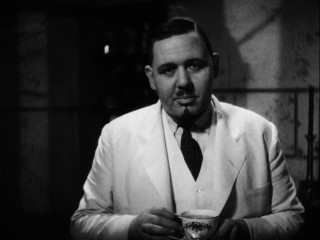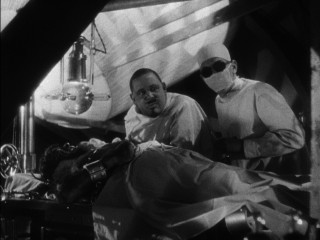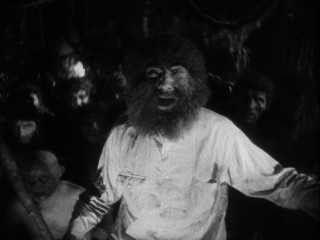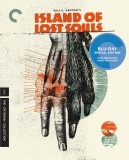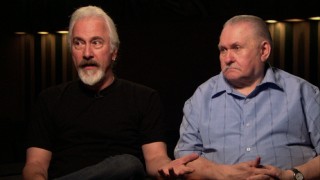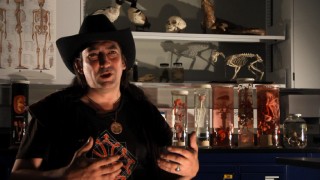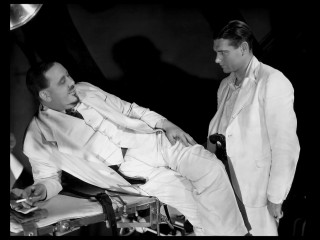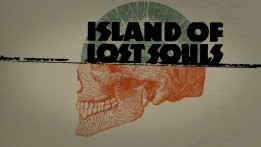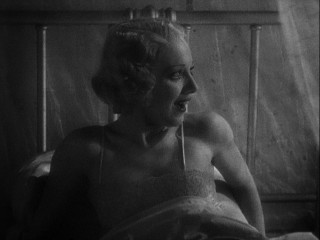Island of Lost Souls: The Criterion Collection Blu-ray Review
 |
Island of Lost Souls
Theatrical Release: December 23, 1932 / Running Time: 71 Minutes / Rating: Not Rated Director: Erle C. Kenton / Writers: Waldemar Young, Philip Wylie (screenplay); H.G. Wells (novel The Island of Dr. Moreau) Cast: Charles Laughton (Dr. Moreau), Richard Arlen (Edward Parker), Leila Hyams (Ruth Thomas), Bela Lugosi (Sayer of the Law), Kathleen Burke (Lota the Panther Woman), Arthur Hohl (Montgomery), Stanley Fields (Captain Davies), Paul Hurst (Captain Donahue), Hans Steinke (Ouran), Tetsu Komai (M'ling), George Irving (The Consul), Bob Kortman (First Mate Hogan), Harry Ezekian (Gola), Buster Brodie (Pig Man), Rosemary Grimes (Samoan Girl), Charles Gemora (Gorilla) |
Buy Island of Lost Souls: Criterion Collection from Amazon.com: Blu-ray DVD
It's hard to think of a modern horror or sci-fi movie that can match Island of Lost Souls in its makings: no violence, no score, minimal action, and none of what we today call visual effects. The Paranormal Activity films can make almost all of those claims, but in style they could not be much further. Where those low-budget "found footage" thrillers employ mundane realism to deliver relatable domestic jolts, That relative infancy of filmmaking is regarded as a golden age for genre features, a period that gave birth to such cinema landmarks as King Kong and Universal's horror tales like Dracula, Frankenstein, and The Mummy. Island is comparable to those films in its stylings.
Adapted from The Island of Doctor Moreau, the third novel written by H.G. Wells in the late 1890s, the film offers a lean story in its speedy 71 minutes. Shipwrecked traveler Edward Parker (Richard Arlen) is rescued by the San Francisco freighter S.S. Covena. His time aboard that vessel is brief, though; after he stands up to the alcoholic Captain Davies (Stanley Fields), he gets dropped onto the ship of Dr. Moreau (Charles Laughton) with other deliveries. With no obvious alternative, Edward journeys to Moreau's small, uncharted private island in the South Seas.
His interest immediately piqued by the island's "natives", who are somewhere between man and beast in appearance and manner, Edward learns that the doctor has been conducting evolutionary experiments, playing God and turning the clocks back or ahead for plant and animal species. Moreau rules over these hairy hybrids, teaching them temperance with mantras and a cracked whip. Already eager to reunite with his fianc้e (Freaks' Leila Hyams), Edward is appalled by his host's monstrous engineering, especially the island's lone female, "pure Polynesian" Lota (Kathleen Burke), whose human figure can only largely mask her panther origins.
Like its esteemed contemporaries, Island doesn't dabble in complexity or intricacies. Its thin story is compelling enough and unfolds without today's attitudes toward suspense and excitement. The movie doesn't need to generate conflict or pick up its pace. With its airs of mystery and danger, the atmospheric setting is quite satisfactory at holding our interest. The plump-lipped Moreau is a clearly drawn villain. Though feared and hideous, his obedient creations earn our sympathy. Fairly bland in his moral objections, Edward is hero by process of elimination.
It helps to come at the film from altogether different things. In the week prior to seeing Island, I watched five films from the past two years and two from the '70s and '80s. Naturally, this pre-Code science fiction offered a stark and appealing change of pace, tone, look, and design. If you were to watch this along with nine other genre movies from the early '30s, it probably wouldn't seem so special. But therein lies the beauty of The Criterion Collection. In celebrating a wide array of cinema from all eras and countries, the boutique line makes it easy to discover and appreciate movies that otherwise might not show up on your radar.
Though not an especially well-known film, both it and the Wells book that inspired it have seeped into modern pop culture in a few ways. The synthpunk band Devo incorporated a recited line of questioning into their first album, 1978's Q: Are We Not Men? We Are Devo! and its song "Jocko Homo" (more on those later). Another musical act, the Irish-American rap group House of Pain (best known for the infectious hit 1992 single "Jump Around"), took their name from Moreau's cruel island laboratory. Wells' novel was also filmed as the 1913 silent French two-reel short The Island of Terror (Ile d'Epouvante), the 1959 Filipino movie Terror is a Man, and 1977's The Island of Dr. Moreau starring Burt Lancaster and Michael York. Furthermore, in 1971, the tale become the directing debut of Tim Burton, whose amateur Super 8 short The Island of Doctor Agor, shot at age 13, has improbably earned an IMDb page.
Last week, Criterion admitted the 1932 version into its annals with a single-disc DVD and Blu-ray, its first official US release on either format, each carrying spine number 586.
Director Erle C. Kenton, who was churning out anywhere from three to eight features a year at the time, would go on to direct The Ghost of Frankenstein and two subsequent monster rally pictures for Universal Studios. Bela Lugosi, the original film Dracula and Ygor in Ghost, plays an animal-man credited as Sayer of the Law in Island.
VIDEO and AUDIO Criterion preserves the original formats of Island of Lost Souls in the Blu-ray's 1.33:1 picture and 1.0 monaural sound. Turning eighty next year, this movie will be the oldest thing that some of its viewers have ever seen. It shows its age and the high resolution of 1080p may even call some extra attention to that. The pillarboxed black & white element is reasonably clean, but it is marred by a faint, persistent flicker, some small scratches, specks, and hairs, and the occasional line. A number of shots lack focus, presumably the result of less time and thought going into the technical side of movies back then. The film is preceded here by Criterion's silent logo, current rights owner Universal's 1997-present logo, and its original Paramount Pictures screen. The LPCM mix is all right, with most of the dialogue remaining intelligible and English subtitles stepping up for anything called into question. It is worth mentioning that at one point, the soundtrack hiccups and a Laughton line is delivered unnaturally. In the same vein, there are a couple of jumpy points where a couple of frames appear to be missing. One does not doubt that this is the best the film has looked on home video and the best that modern technology and Criterion's budget currently allow. With reasonable expectations, that is more than good enough.
BONUS FEATURES, MENUS, PACKAGING and DESIGN This is yet another solid Criterion effort in the supplements department. Extras begin with an audio commentary by film historian Gregory Mank. Kicking off the all-HD video extras slate is "Landis, Baker, and Burns" (16:53), a 2011 conversation between director John Landis (An American Werewolf in London, Michael Jackson's Thriller), make-up effects artist Rick Baker, and horror aficionado Bob Burns. They sing the praises of Island of Lost Souls, paying special notice to the hair and make-up work and lamenting the present state of monster movies. Next, there is a new interview of cultural historian David J. Skal (13:04). His comments place Island and the book that inspired it in the context of its mediums and release. It adds more good information to the mix. Providing a different perspective is an interview with Richard Stanley (14:15), the South African original director of the 1996 Marlon Brando-Val Kilmer adaptation, who ended up being replaced by John Frankenheimer. In the first half, he comments on Wells' novel and its themes. Then, he turns to his career-killing version, explaining the updates his script made that were ultimately discarded and how the doomed production was shut down.
"Casale and Mothersbaugh" edits together separate new interviews with Gerald Casale and Mark Mothersbaugh, two of the founding members of Devo, (19:48) on Island's influence on the band's music and de-evolution manifesto. It overstates the connection, but offers good insight into Devo's origins. Another bone is thrown in Devo fans' direction with the inclusion of the 1976 short film In the Beginning Was the End: The Truth About De-evolution (9:43), the music videos for the band's "Secret Agent Man" cover and "Jocko Homo." You could question the relevance, or you could just enjoy the entertainment value, which is above and beyond that of most bonus features. You're probably familiar with the band's "Whip It" music video; these ones are comparably weird and creative. The first dresses the band in jumpsuits, hard hats, and masks (they come straight from a work day at the factory). The second has them repeating their Island-inspired, album-naming credo in some kind of medical school classroom with surgical masks, caps, and rubber gloves abound. A stills gallery consists of 53 black and white publicity photos, capturing make-up work, scenes, and some staged behind the scenes.
Last but not least, we get Island's original theatrical trailer (1:30), which credits Kathleen Burke as "The Panther Woman" and Bela Lugosi as Bela "Dracula" Lugosi. Inaccessible by menu but found in disc exploration is a brief, goofy television interview (1:43) from Cleveland's WJW. By the magic of split-screen effects, Ernie Anderson chats with Ghoulardi, his alter ego who hosted the station's local late night "Shock Theater" program from 1963 to 1966. An opening caption explains this is where Casale and Mothersbaugh discovered Island. The menu presents a scratchy graphic hybrid montage in the vein of the cover art that is set to the film's opening/only music. As always, Criterion's masterful disc authoring skills support bookmarks and resuming. Though that covers everything on the disc, we must take note of something next to the disc: yet another one of Criterion's fine companion booklets. This one numbers 16 pages and serves up all the transfer, disc, and film information you could want along with more nice illustrations. The booklet's center and centerpiece is "The Beast Flesh Creeping Back", a 6-page essay by Christine Smallwood. With straightforward prose, she views the film through modern eyes, noting its influences and its casualties. The article offers a good mix of production information and critical analysis. The appealing booklet is held in a clear Blu-ray-sized, DVD-style case, which uses its transparency to display inside the animal-men's repeated laws.
CLOSING THOUGHTS By today's standards, Island of Lost Souls is a tame B-movie and its artistry truly is limited. That doesn't, however, render this old horror flick any less than engrossing, fascinatingly distant from modern fare but also entirely entertaining in the narrative way intended. Criterion's Blu-ray does not surmount all the obstacles an 80-year-old movie presents, but this long overdue official disc debut highly satisfies with its nice, dramatic restoration and a sturdy two hours of bonus features highlighted by an excellent commentary and the delicious eccentricity of a Devo music video. I can't imagine anyone not getting some enjoyment out of this fine set; whether or not 1930s genre films are your cup of tea, an occasional taste is most pleasing to one's palate. Support this site when you buy Island of Lost Souls: Criterion Collection now from Amazon.com: Blu-ray / DVD
|
Related Reviews:
DVDizzy.com | DVD and Blu-ray Reviews | New and Upcoming DVD & Blu-ray Schedule | Upcoming Cover Art | Search This Site
New to Blu-ray: Jackie Brown Scrooged The Tree of Life 3 Women (Criterion) My Life as a Dog (Criterion) Dumbo
1930s Movies: Scarface (1932) Stagecoach Snow White and the Seven Dwarfs Grand Hotel
Charles Laughton: Mutiny on the Bounty (1935) Salome | Richard Arlen: Wings
Planet of the Apes (1968) The Black Hole Igor Something Wicked This Way Comes Teen Wolf
